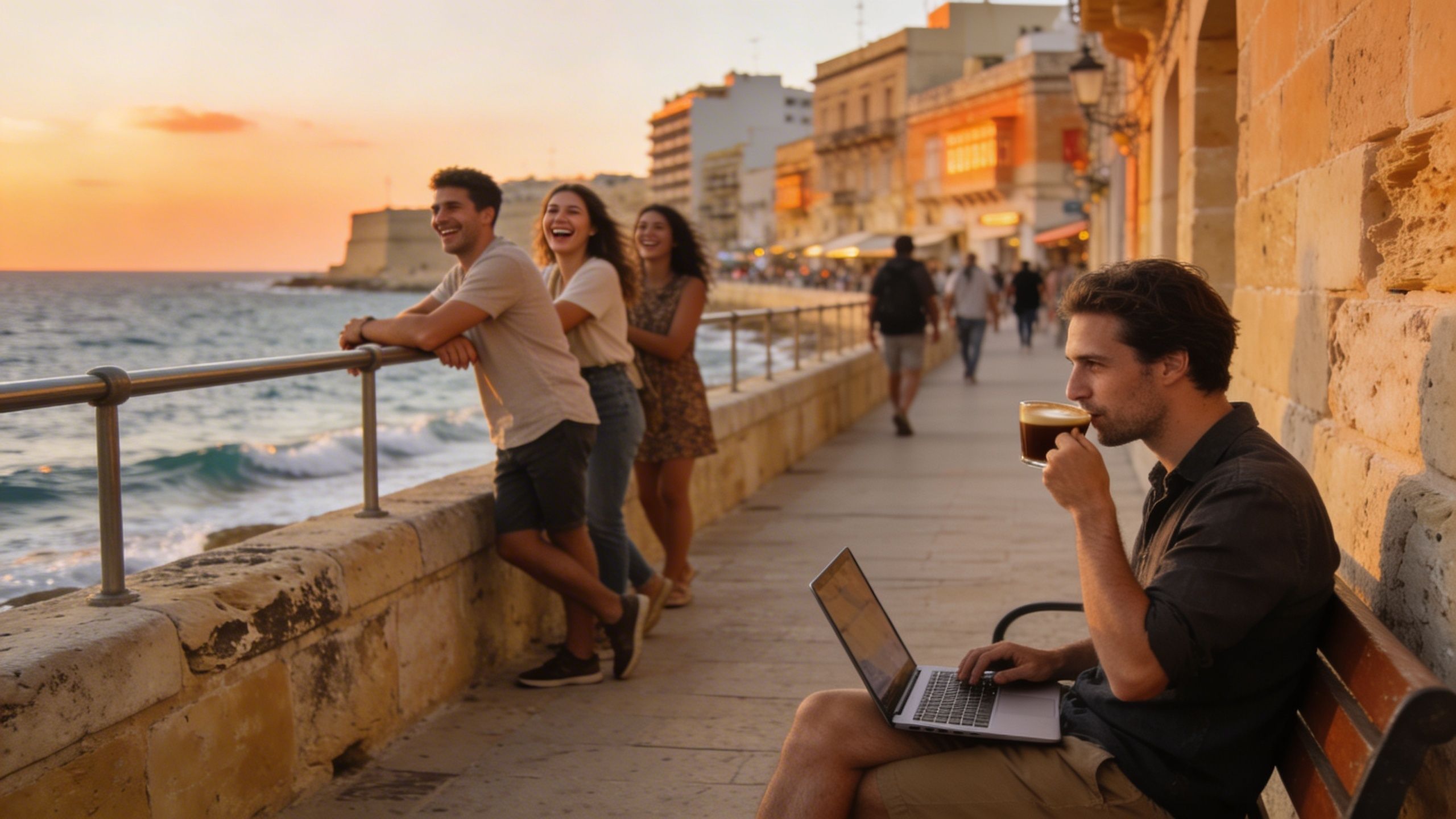Neighbourhood Paradox: Avoided French Areas That Shine
The neighbourhood everyone tells you to avoid can be the best place to buy in France — smaller towns and overlooked city pockets offer lifestyle upside and value backed by Q1 2025 data.
Imagine sipping a flat white on a sun-dappled pavement in Lyon’s Croix-Rousse, then closing your laptop and walking five minutes to a Tuesday market heaving with figs and oysters. Picture coastal towns where fishermen still shout prices and weekend crowds evaporate on Monday morning — the kind of places where nomads find cheap cafés with reliable Wi‑Fi, friendly landlords and apartments with terraces. France isn’t a single mood; it’s a dozen micro-lives stitched together. That variety is why the neighbourhood everyone warns you to avoid might be the exact place you belong.
Living the French Lifestyle — up close

Daily life in France moves between ritual and surprise. Mornings belong to cafés and boulangeries; afternoons to markets, siestas in quieter towns or co‑working sprints in coastal coworking hubs; evenings to long dinners and passeggiata-style walks. Different neighbourhoods set different rhythms — an apartment in Le Marais hums with galleries and late-night bars, while a narrow street in La Rochelle feels like living inside a postcard. For remote workers, the question isn’t just square metres but when and how the neighbourhood comes alive.
Spotlight: Le Marais, Paris — cobbles, courtyards and creative energy
Le Marais is a sensory overload in the best way: galleries, falafel stands, tiny wine bars and hidden courtyards. Walkability is unbeatable; you can meet colleagues at a sunny terrace, take a lunchtime museum detour and be back at your desk in under an hour. But charm comes at a price — not only euro-per-metre costs, but stricter renovation rules and higher competition for apartments with character. If lifestyle trumps square metres, this is where you buy the Parisian life; if not, there are neighbourhoods nearby that give the same vibe for less.
Spotlight: Coastal towns — La Rochelle, Biarritz and the weekday calm
Coastal towns flip between festival-season frenzy and off-season stillness. La Rochelle and nearby villages glow with morning markets and sheltered harbours; Biarritz hums with surf culture and strong café Wi‑Fi. For nomads, weekdays outside high season offer lower rents, friendlier landlords and easy networking in small coworking spaces. But check local amenities: ferry timetables, hospital access and seasonal shop closures can change the lived experience dramatically from June to November.
- Lifestyle highlights to scout on day one
- Morning cafés with power outlets (look for corner cafés near markets).
- Evening neighbourhood squares with regular community events.
- Local markets open at least twice a week for fresh produce and serendipity.
- A nearby coworking space (even small towns often have one).
Making the Move: lifestyle-first practicalities

The market is no longer one-directional: Q1 2025 showed modest national price growth after a period of stability, but regions diverge sharply. Paris and some coastal and rural markets have rebounded while many mid-sized cities remained flat or fell. That split creates opportunity: avoided neighbourhoods in a recovering area can offer value and fast lifestyle upside — you get the coffee culture without the investor premium. Use national indexes to set expectations, but weigh them against hyperlocal trends.
Property styles that fit nomad life
In cities, compact flats with a balcony beat empty lofts when you want outdoor breaks and easy maintenance. In small towns, look for refurbished townhouses with flexible ground-floor space for a home office. Villas near the coast are dreamy, but factor in seasonal service costs and lower weekday community. Prioritise: stable broadband, plug-and-play work corners, and a clean, well-maintained heating system for winter months — these matter more than square metres for remote productivity.
Working with local experts who get lifestyle outcomes
Find agents who don’t only list metrics but tell you where to grab the best morning espresso, which streets clear of tourists on Mondays and who’ll negotiate WLIs (work‑life improvements) into a sale — think included broadband upgrade or a terrace clean before handover. Local notaires and agents can translate municipal rules that affect renovation, terraces and short‑term rental restrictions. Ask for client references from expats or nomads and insist on a neighbourhood tour at different times of day.
- Six lifestyle-practical checks before you bid
- Check fixed broadband speed at the exact address (run a speed test at the flat).
- Visit on a weekday and weekend to feel noise, market days and commuter flow.
- Ask neighbours about seasonal closures (shops, boulangeries, healthcare availability).
- Confirm property heating & insulation details — winters vary across France.
- Request recent energy and utility bills to estimate living costs.
- Ask the agent about local coworking memberships and expat meetups.
Insider Knowledge: the neighbourhood paradox explained
Here’s the contrarian truth: areas other buyers avoid often have the fastest lifestyle gains. When investors skip a neighbourhood because it looks ‘untidy’ or is outside a commuter belt, creative communities move in first. New cafés, coworking hubs and weekend markets appear, and property values follow. That’s not a guarantee — do your due diligence — but it explains why a local street deemed risky can, within a few seasons, become the next place you brag about on brunch Sundays.
How culture shapes where you fit
French social life is neighbourhood-based: your boulangerie and the corner bistro often dictate friendships. Locals value discretion and long-term relationships; showing respect for local rhythms — greeting shopkeepers in French, attending market days, keeping noise low — accelerates acceptance. For nomads, learning a few phrases and frequenting the same places is the fastest integration tactic. Community beats contract clauses when it comes to feeling at home.
Long-term lifestyle checks most nomads forget
Nomads focus on immediate vibes and can forget long-term constraints: municipal renovation rules, noise ordinances, and changing tax measures can alter future flexibility. Use national data to see where prices are trending, then speak to a local notaire about planned urban projects or zoning shifts. These often determine whether your neighbourhood will stay quiet or transform into a hotspot — and whether your purchase is a lifestyle anchor or a speculative bet.
The before-and-after move is subtle but real. Before, you chase unique cafés and cheap short-term rentals; after, you keep the cafés but gain routines: a favourite market stall, a dentist with English-speaking staff, a local coworking table you reserve every Monday. The right agent helps translate that routine into property features — a bright nook for calls, a terrace for evening friends, reasonable monthly condo charges. That’s where lifestyle meets the contract.
- Three neighbourhoods where the 'avoid' tag can mean opportunity
- Lyon’s Guillotière — ethnically vibrant, improving transport links and honest prices.
- Sections of Marseille outside Vieux-Port — community-driven pockets with creative growth.
- Small-town centres near Poitiers and Troyes — value gains and restored town life (recent price rises reported).
Quick reference: market signals worth tracking
- Quarterly price direction (INSEE) — rebound or cooling spells matter regionally.
- Local renovation permits — new cafés and coworking often follow approvals.
- Transport upgrades — new tram or regional train stops transform commutes.
Ready to take the next step? Start small: rent a month in a neighbourhood you like and test mornings, afternoons and nights. Ask a local agent for a neighbourhood-to-property mapping — one that lists where to work, where to eat, where to meet people. Bring that map to viewings and ask the owner to point out the weekly rhythms. If you love it at 10am on a Tuesday, you’ll probably love living there.
Conclusion: chase the life, not the postcode. France rewards those who look beyond glossy listings and glossy brochures. The neighbourhood everyone avoids can offer morning markets, cheap coworking, friendly landlords and — most importantly — a life you actually want to live. Use national data to be smart, local experts to be precise, and your senses to decide if a place feels like home.
Swedish, relocated to Marbella in 2018 to chase sun and property freedom. Focus on legal navigation and tax for Nordic buyers.


